
PEST MANAGEMENT SCIENCE
Scope & Guideline
Shaping Tomorrow's Pest Control Methodologies
Introduction
Aims and Scopes
- Integrated Pest Management (IPM) Strategies:
The journal publishes research on IPM approaches that combine biological, chemical, cultural, and ecological practices for sustainable pest control. - Chemical Control Innovations:
Research on the development, efficacy, and safety of new pesticides, including their modes of action, resistance mechanisms, and environmental impacts. - Biological Control Mechanisms:
Studies focusing on the use of natural enemies, such as predators, parasitoids, and entomopathogenic fungi, to manage pest populations. - Resistance Management:
Investigations into the mechanisms of pest resistance to insecticides and herbicides, as well as strategies to mitigate resistance development. - Ecological and Environmental Impacts:
Research on the effects of pest management practices on non-target organisms, ecosystems, and biodiversity. - Genetic and Molecular Studies:
Exploration of genetic factors influencing pest resistance and the application of molecular techniques, including RNA interference, for pest control.
Trending and Emerging
- RNA Interference (RNAi) Techniques:
The application of RNAi as a pest control strategy is gaining traction, with studies focusing on gene silencing to manage pest populations effectively. - Sustainable and Eco-Friendly Practices:
Research focused on the development of biocontrol agents and environmentally safe pesticides is on the rise, reflecting a broader commitment to sustainable agriculture. - Precision Agriculture Technologies:
The integration of UAVs (drones) and machine learning for pest detection and management is increasingly prevalent, showcasing advancements in precision agriculture. - Microbial Biocontrol Agents:
There is a growing interest in utilizing entomopathogenic fungi and bacteria as biocontrol agents, highlighting a shift towards biological rather than chemical control methods. - Climate Change Adaptation Strategies:
Research addressing the impacts of climate change on pest dynamics and management strategies is emerging, reflecting the need to adapt pest control practices to changing environmental conditions. - Interdisciplinary Research Approaches:
Studies that combine ecology, genetics, and molecular biology with pest management are trending, promoting a holistic understanding of pest dynamics.
Declining or Waning
- Traditional Chemical Pesticide Reliance:
There has been a noticeable decline in research focused solely on traditional chemical pesticides without consideration for integrated approaches or environmental impacts. - Single-Species Control Studies:
Research focusing exclusively on single pest species control is decreasing, with a shift towards studies that consider pest-community interactions and ecosystem dynamics. - Static Resistance Assessments:
Past approaches that assessed resistance solely in laboratory settings are being replaced by more dynamic studies that consider field conditions and environmental interactions. - Overemphasis on Laboratory Studies:
There is a growing trend to prioritize field studies and real-world applications over laboratory-based research, indicating a shift towards practical pest management solutions.
Similar Journals
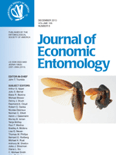
JOURNAL OF ECONOMIC ENTOMOLOGY
Transforming Insect Science into Practical SolutionsJOURNAL OF ECONOMIC ENTOMOLOGY, published by OXFORD UNIV PRESS INC, stands as a premier interdisciplinary platform for researchers and professionals in the realms of entomology and ecological sciences. With a robust publication history dating back to 1945, this esteemed journal has consistently maintained its reputation for disseminating high-quality research, as evidenced by its prestigious Q1 rankings in both Ecology and Insect Science for 2023. The journal’s impact is highlighted by its excellent Scopus ranks, placing it in the top percentile of Agricultural and Biological Sciences and Environmental Science categories. Aimed at advancing the understanding of insects and their relationships with humans and ecosystems, the JOURNAL OF ECONOMIC ENTOMOLOGY offers a critical forum for original research articles, reviews, and opinion pieces that influence practices in pest management, conservation, and agricultural productivity. Although not an Open Access journal, its findings are pivotal for students, researchers, and professionals striving to address contemporary challenges in entomology and beyond.
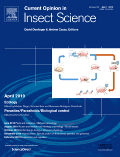
Current Opinion in Insect Science
Illuminating the World of Insect ResearchCurrent Opinion in Insect Science is a leading academic journal published by ELSEVIER, dedicated to advancing understanding in the field of insect science. With an impressive impact factor reflected in its top quartile rankings (Q1) within both Ecology, Evolution, Behavior and Systematics and Insect Science, the journal holds a prominent position, ranking 3rd out of 181 journals in Insect Science and 35th out of 721 in Ecology-related fields according to Scopus for 2023. Since its inception in 2014, the journal has provided a dynamic platform for researchers, professionals, and students to explore and share cutting-edge developments and insights, targeting crucial topics in insect biology, ecology, and systematics. Although there are no open access options available, Current Opinion in Insect Science remains an essential resource for those looking to stay at the forefront of their research or academic interests.
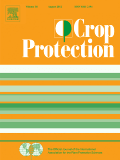
Crop Protection
Advancing sustainable solutions for global agriculture.Crop Protection is a leading academic journal in the field of Agronomy and Crop Science, published by Elsevier Science Ltd, and recognized for its high impact demonstrated by an impressive Q1 quartile ranking in 2023. With its ISSN 0261-2194 and E-ISSN 1873-6904, this esteemed publication has been a crucial source of research since its inception in 1982, continuing to provide valuable insights and advancements in crop protection strategies through 2024. The journal serves a diverse audience, including researchers, professionals, and students, eager to explore pioneering findings in pest management, herbicide development, and sustainable agricultural practices. While the journal does not offer open access options, its rigorous peer-review process ensures the highest quality of scholarly articles that contribute significantly to the agricultural and biological sciences, maintaining its respected position with a Scopus rank of #63 out of 406 in its category, placing it in the 84th percentile. Engaging with Crop Protection not only enriches knowledge but also promotes innovative solutions for global agricultural challenges.

EXPERIMENTAL AND APPLIED ACAROLOGY
Unraveling the Complexities of Mites for a Healthier TomorrowEXPERIMENTAL AND APPLIED ACAROLOGY is a leading international journal that serves as a premier platform for the dissemination of cutting-edge research in the fields of Ecology, Insect Science, and Medical applications related to acarology. Published by Springer, this esteemed journal has been pivotal in advancing our understanding of mite-related science since its inception in 1985, and it anticipates continued publication until 2024. With an impressive ranking in the Q2 quartile across multiple categories, including Ecology (Rank #154/461) and Insect Science (Rank #42/181), it firmly establishes itself as a significant contributor to the scientific community. Although not an Open Access journal, its rigorous peer-review process ensures high-quality publication standards, appealing to researchers, professionals, and students alike. Aiming to bridge gaps between experimental research and practical applications, EXPERIMENTAL AND APPLIED ACAROLOGY plays a crucial role in enhancing knowledge and discoveries related to acarology, highlighting its vital importance in ecology and health sciences.

JOURNAL OF PEST SCIENCE
Advancing pest management through innovative research.JOURNAL OF PEST SCIENCE, published by SPRINGER HEIDELBERG, is a premier academic journal dedicated to the multidisciplinary study of pest management, contributing significantly to the fields of Agronomy, Ecology, and Insect Science. With a history that spans back to 1925, this journal has established itself as a critical platform for disseminating innovative research, evidenced by its impressive Q1 rankings in multiple categories, including Ecology and Plant Science, as of 2023. The journal particularly excels in its contribution to Agricultural and Biological Sciences, holding a remarkable 98th percentile rank in Insect Science. By fostering open access, the JOURNAL OF PEST SCIENCE ensures broader dissemination and engagement with scientific advancements pertinent to pest control and management practices. Its commitment to publishing high-quality, peer-reviewed articles makes it an essential resource for researchers, professionals, and students looking to stay at the forefront of pest science and its application to sustainable agriculture and ecology.
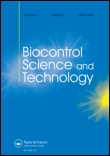
BIOCONTROL SCIENCE AND TECHNOLOGY
Transforming Agriculture Through Innovative Insect ScienceBIOCONTROL SCIENCE AND TECHNOLOGY is a premier, peer-reviewed journal published by Taylor & Francis Ltd that specializes in the dynamic fields of Agronomy and Insect Science. Established in 1991, this journal has garnered a reputation for disseminating high-quality, impactful research with an impressive 2023 Scopus rank of 53 out of 181 in Insect Science and 153 out of 406 in Agronomy, placing it in the Q2 category for both fields. With its ISSN 0958-3157 and E-ISSN 1360-0478, the journal serves as a vital resource for researchers, professionals, and students dedicated to advancing understanding and innovation in pest management and biocontrol strategies. Although not an open-access journal, it offers comprehensive insights that are crucial for professionals aiming to tackle agricultural challenges and enhance food security. The journal’s continuous coverage from 1991 to 2024 ensures that it remains at the forefront of significant advancements in biocontrol, making it an essential read for anyone interested in sustainable agricultural practices and integrated pest management.
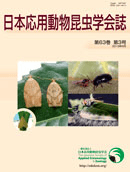
JAPANESE JOURNAL OF APPLIED ENTOMOLOGY AND ZOOLOGY
Diving Deep into the World of Insects and BiodiversityJapanese Journal of Applied Entomology and Zoology is a premier publication in the field of Insect Science, offering a platform for researchers and practitioners to share their findings on applied entomology and zoology. Established in 1957 and published by the Japan Society of Applied Entomology and Zoology, this journal aims to foster the understanding of insect-related studies that impact agriculture, ecology, and biodiversity. With an ISSN of 0021-4914 and E-ISSN of 1347-6068, it serves as a crucial resource for both academics and industry professionals. While the journal currently resides in the Q4 category of the Scopus ranking for Insect Science with a percentile of 11th, it plays a significant role in providing valuable insights into insect behavior, systematics, and their ecological roles. Readers can benefit from its published research to drive innovations and solutions in pest management and conservation practices. As the journal continues to evolve, it reinforces its commitment to disseminating critical research that supports sustainable practices in entomology and zoology through its convergence extending to the year 2024.

Frontiers in Insect Science
Innovating Solutions for Biodiversity and AgricultureFrontiers in Insect Science is a pioneering open-access journal dedicated to the advancement of knowledge in the field of insect science. Published by FRONTIERS MEDIA SA in Switzerland, this journal serves as a vital platform for researchers, professionals, and students to disseminate high-quality, peer-reviewed research spanning diverse topics within insect biology, ecology, and pest management. Since its establishment in 2021, the journal has gained recognition, ranking in the Q2 category of Insect Science with a Scopus ranking of #92 out of 181 in the field. With a commitment to promoting open access and collaboration, Frontiers in Insect Science is instrumental in fostering innovative research and practical applications essential for combating biodiversity loss and enhancing agricultural sustainability. As a freely accessible resource, it invites contributions that impact both fundamental and applied insect research, connecting a global network of scholars eager to explore the fascinating world of insects.
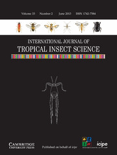
INTERNATIONAL JOURNAL OF TROPICAL INSECT SCIENCE
Connecting Scholars in Tropical Insect ScienceINTERNATIONAL JOURNAL OF TROPICAL INSECT SCIENCE, published by Springer International Publishing AG, is a leading interdisciplinary journal dedicated to advancing knowledge in the fields of insect science and ecology. With its ISSN 1742-7584 and E-ISSN 1742-7592, this journal provides a platform for researchers to publish high-quality, peer-reviewed articles that explore various aspects of tropical insect biology, behavior, and their ecological impacts. As evidenced by its Q3 ranking in both Ecology, Evolution, Behavior and Systematics and Insect Science, it plays a vital role in fostering scientific dialogue and innovation within these disciplines. Researchers affiliated with the journal benefit from its visibility and growing impact, as demonstrated by its Scopus ranks, with a percentile standing of 61st in Insect Science. Although the journal is not open access, it still reaches a wide academic audience, making significant contributions to our understanding of tropical ecosystems. Situated in Switzerland, this journal is crucial for students, professionals, and researchers invested in the intersection of entomology and ecological science.

BIOCONTROL
Advancing sustainable pest management through innovative research.BIOCONTROL is a leading academic journal published by Springer, focusing on the intricate dynamics of biological control in agronomy and insect science. Established in 1998, this journal has effectively contributed to the field’s understanding of pest management and sustainable agriculture practices. With a commendable impact factor and category rankings placing it in the Q1 quartile for both Agronomy and Crop Science as well as Insect Science, it ranks among the top-tier journals in its domain. The journal is accessible to a broad audience, offering a comprehensive platform for researchers and practitioners to share innovative findings and methodologies. By fostering the advancement of knowledge in biological control, BIOCONTROL plays an essential role in promoting environmentally responsible practices that address contemporary agricultural challenges. Engage with the latest research and developments from the Netherlands and beyond, as we explore the future of sustainable agriculture in an ever-evolving landscape.